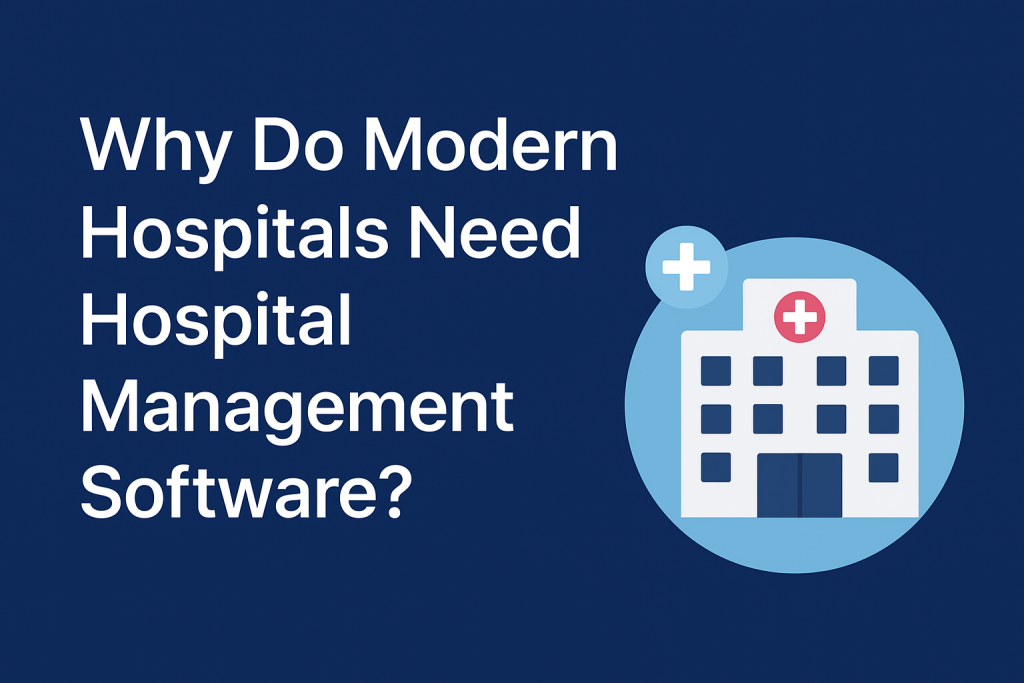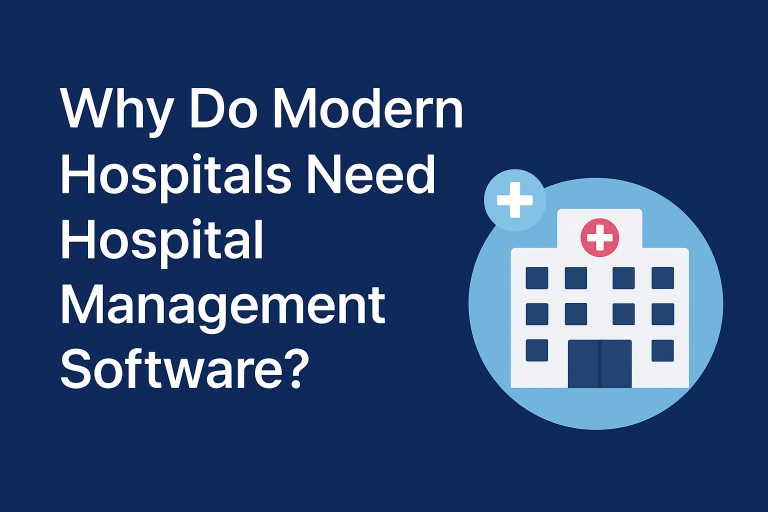The healthcare industry has been undergoing a massive digital transformation. Hospitals and clinics are no longer relying only on manual processes; instead, they are adopting advanced technologies to streamline operations. One of the most impactful tools in this digital shift is hospital management software.
This solution is designed to manage patient data, billing, appointments, staff operations, and much more—all in one place. With the ever-growing demand for efficiency and accuracy, understanding why hospital management software is essential is crucial for healthcare providers of all sizes.
What Exactly Is Hospital Management Software?
At its core, hospital management software is a digital platform that integrates all hospital operations into a unified system. From patient registration to discharge, it manages records, schedules, payments, and reports. Unlike manual systems that are prone to errors and delays, hospital management solutions ensure seamless workflows.
Moreover, they enhance patient experience by reducing waiting times, offering quick access to medical records, and simplifying billing procedures. This results in greater satisfaction for patients while also empowering staff with better tools to perform their jobs effectively.
Why Hospitals Need Digital Transformation
Today’s hospitals face numerous challenges: increasing patient numbers, shortage of healthcare staff, and rising operational costs. Digital tools, such as hospital software, solve these issues by automating repetitive tasks. This reduces documentation and mistakes allowing medical staff to focus more on patient care and less on management responsibilities.
Additionally, hospital software promotes transparency in operations. For example, administrators can access real-time reports on patient inflow, resource usage, and financial performance. This kind of insight helps in making data-driven decisions that lead to better outcomes.
Benefits of Hospital Management Software
There are several advantages to adopting hospital management software. Some of the key benefits include:
- Efficiency: Automates repetitive tasks like billing and scheduling.
- Accuracy: Reduces the chances of manual errors in patient records.
- Patient Care: Enhances patient experience with faster services.
- Data Insights: Provides administrators with valuable reports and analytics.
- Integration: Connects different departments such as pharmacy, laboratory, and billing into one system.
Each of these benefits contributes to creating a patient-centered approach while also making the hospital environment more manageable for staff.
How Pharmacy Management Software Supports Healthcare Systems
Beyond hospitals, pharmacies play a vital role in the healthcare ecosystem. Managing medicines, tracking stock levels, and handling prescriptions manually often leads to mistakes. That’s why many facilities are adopting pharmacy management software to streamline these processes.
With such solutions, pharmacists can track inventory, monitor expiration dates, and automatically reorder essential drugs. In addition, doctors can send e-prescriptions directly to pharmacies, ensuring patients receive the correct medication. This reduces human error while also making pharmacy operations more efficient and profitable.
The Role of Laboratory Software in Modern Healthcare
Another critical piece of healthcare technology is laboratory software. Labs are essential for diagnosis, yet manual record-keeping often causes delays or errors. Laboratory systems ensure that test results are accurate, secure, and quickly shared with doctors and patients.
For instance, laboratory software can generate detailed reports instantly, notify doctors when results are ready, and securely archive past results for future reference. By adopting such solutions, healthcare providers can reduce turnaround times while maintaining high standards of quality and accuracy.

Trends Driving the Adoption of Hospital Software
The rise of telemedicine, remote patient monitoring, and AI-driven healthcare tools has accelerated the adoption of hospital software. Patients now expect convenience and transparency in their healthcare journey, and hospitals must keep up with these expectations.
Moreover, governments worldwide are encouraging the digitization of healthcare systems. Policies, incentives, and public health programs all emphasize the need for reliable hospital software. This trend will continue, making such solutions a necessity rather than an option.
Integration with Pharmacy Management Systems
Hospitals don’t operate in isolation. They rely heavily on connected systems like pharmacy management software to provide complete patient care. When integrated with hospital management systems, pharmacies can automatically receive prescriptions, check stock, and update billing seamlessly.
This integration not only saves time but also reduces miscommunication between doctors, pharmacists, and patients. Ultimately, it ensures that patients receive their medicines on time, with fewer chances of errors or shortages.
Why Laboratories Need Advanced Tools
Just as pharmacies benefit from digitization, laboratories must also modernize their operations. By adopting laboratory software, hospitals can provide faster diagnostics, store results securely, and make them instantly available to doctors.
This kind of integration ensures smoother workflows. For example, when a doctor orders a test, the request directly enters the lab system. Once the results are ready, they are automatically sent back to the doctor for review. Such seamless communication reduces delays in diagnosis and improves patient outcomes.
Future of Hospital Management Software
Looking ahead, hospital management software will continue evolving with technologies like artificial intelligence (AI), machine learning, and predictive analytics. These advancements will allow hospitals to anticipate patient needs, optimize resource allocation, and provide more personalized care.
Additionally, as healthcare moves toward patient-centric models, software systems will enable hospitals to engage with patients in real time, track recovery progress, and provide proactive support. This makes hospital management systems not just a tool for efficiency but also a critical driver of better healthcare outcomes.
How to Choose the Right Solution
If you’re considering adopting hospital software, here are some tips to guide your decision:
- Scalability: Ensure the software can grow with your hospital.
- Integration: Check if it works well with pharmacy and laboratory systems.
- User-Friendly: Staff should be able to use it without steep learning curves.
- Security: Patient data must be secure and compliant with regulations.
- Support: Choose providers that offer ongoing updates and technical assistance.
By following these steps, hospitals can select the best digital solution for their needs.
Frequently Asked Questions (FAQs)
Q1. What is hospital management software?
It is a digital platform designed to streamline hospital operations, from patient registration to billing and reporting.
Q2. How does hospital software improve efficiency?
By automating administrative tasks, reducing errors, and providing real-time data access.
Q3. What role does pharmacy management software play in healthcare?
It helps pharmacists manage inventory, prescriptions, and billing while reducing errors.
Q4. Why is laboratory software important for hospitals?
It ensures accurate test results, reduces turnaround times, and improves communication with doctors.
Q5. What should I look for when choosing hospital management software?
Scalability, integration, ease of use, security, and dependable support are important considerations.
Conclusion
In conclusion, modern healthcare professionals must now use hospital management software; it is no longer an option. Whether it’s reducing administrative burdens, improving patient experiences, or integrating with systems like hospital software, pharmacy management software, and laboratory software, these solutions are redefining the way healthcare operates.
As the future of healthcare becomes more digital, hospitals that invest in these tools today will be better prepared for tomorrow. By choosing the right system, healthcare providers can ensure efficiency, accuracy, and—most importantly—better patient care.

